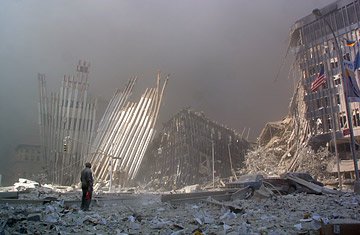
A man stands in the rubble, and calls out asking if anyone needs help, after the collapse of the first World Trade Center Tower in New York City on September 11, 2001.
The Fight for Flight 93
"I know we're all going to die. There's three of us who are going to do something about it." That's what Tom Burnett told his wife Deena. Burnett was one of 38 passengers and seven crew members aboard hijacked United Airlines Flight 93, and he was not the only person to relay information to a loved one. In first-class seat 4D, public relations executive Mark Bingham used an airplane phone to call his mother. "Mom, this is Mark Bingham," he said, so rattled that he included his last name. "Three guys have taken over the plane, and they say they have a bomb." Back in coach, Jeremy Glick phoned his wife Lyzbeth to say, "Three Arab-looking men with red headbands" had taken over the cockpit.
Flight 93 was the last of the hijacked planes to meet its fate. All three passengers knew about the attacks on the World Trade Center. Did they do what we think they did? Did three strangers on a flight in distress band together to fight their captors and ditch the Boeing 757 before it could harm untold thousands?
Investigators have recovered Flight 93's black boxes, and they may tell us something definitive. But those closest to Burnett, Bingham and Glick say they don't need confirmation. "You'd have to know Mark," says Bingham's aunt Kathy Hoglan. "I'm sure he and the others did something to stop this." "He knew that stopping them was going to end all of their lives," says Jeremy Glick's brother-in-law Douglas Hurwitt. "But that was my brother-in-law. He was a take-charge guy." Deena Burnett says, "I know without a doubt that the plane was bound for some landmark and that they saved many, many more lives than were lost on that plane."
Other relatives of people on Flight 93 have spoken up too and assigned their loved ones a heroic narrative. Those of the captain, Jason Dahl, say he would never have allowed hijackers to take control of his plane without a fight. But there is something about the similarities of these three passengers that makes the portrait of them as confederates perfectly imaginable. All three were large, athletic, decisive types. Bingham, 6 ft. 5 in., played rugby when at the University of California, Berkeley, and still played for the San Francisco Fog, a gay amateur team. Glick, 6 ft. 4 in., was a national collegiate judo champion, according to the website of the software firm for which he was a sales manager. Burnett, 6 ft. 1 in., was a former high school football player and an executive of a medical-devices firm. All three were nimble, successful, charismatic, self-elected leaders--the kind that have a knack for finding one another.
We'd like to think they did it. We may never know. Yet Glick's last words to his wife Lyzbeth, like Burnett's vow of action to his wife, make us want to believe they prevailed, taking Flight 93 down in a Pennsylvania coalfield far from any metropolis. "We're going to rush the hijackers," said Glick. Then he put down the phone. --By Josh Tyrangiel
Among the Clouds
